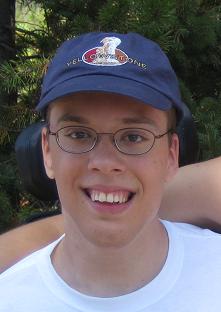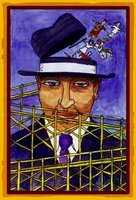 Last week, at my request, an occupational therapist and 2 rehabilitation engineers from the University of Illinois Chicago Assistive Technology Unit came to my house for an evaluation of a couple of my needs – a cell phone that I can use independently and a custom tray that will allow me to use my laptop, voice recognition software, and large Kensington trackball in my wheelchair. I had used the A.T. Unit’s services once before for a household adaptation and had had a very positive experience. Usually when I meet with service providers, I prepare myself for disappointment – disappointment in the attitude, capabilities, effort, and vision of the service provider, because that is the norm. But, this time, based on my past experience with A.T. Unit, I was feeling cautiously optimistic. I was not let down.
Last week, at my request, an occupational therapist and 2 rehabilitation engineers from the University of Illinois Chicago Assistive Technology Unit came to my house for an evaluation of a couple of my needs – a cell phone that I can use independently and a custom tray that will allow me to use my laptop, voice recognition software, and large Kensington trackball in my wheelchair. I had used the A.T. Unit’s services once before for a household adaptation and had had a very positive experience. Usually when I meet with service providers, I prepare myself for disappointment – disappointment in the attitude, capabilities, effort, and vision of the service provider, because that is the norm. But, this time, based on my past experience with A.T. Unit, I was feeling cautiously optimistic. I was not let down.
Here’s how the visit went…
First, they came on the same day that the said they would, and they even called to let me know that they were going to be a little late. Courteous. Respectful of the value of my time.
When they came in the door, they made eye contact with me, introduced themselves, and said hello to me. They were respectful to my mom, but recognized me as their client. More respect. Professionalism.
Then they asked me about my needs and my goals. More respect. They didn’t ask about my diagnosis or my “problems”; they weren’t relevant to the problem-solving. No pity, no shame, no getting off track.
The A.T. service providers never questioned the value of my goals; they accepted them as worthy, because I said they were important to me. Client respect.
The 3 providers were incredibly detailed in their evaluation of my needs – taking measurements and photographs, and asking specific questions to make a thorough assessment. They bounced creative ideas off of each other and off of me and my mom. Goal-oriented teamwork with a real effort to address my needs.
I am excitedly looking forward to see their solutions. To have my own cell phone would allow me control over my own phone calls. It would allow me to be out without a personal assistant, knowing that I could call for assistance if needed. The adapted tray will allow me to use my laptop computer set-up at college for note-talking, paper-writing and any other work that I need to do.
The Assistive Technology Unit at UIC is an example of an organization that is supportive of my life goals, supportive of my desire for independent living.
If I want to live independently, does that mean that I have to do everything for myself?
No. If self-sufficiency were the definition of independent living, then nobody lives independently these days. The pioneer families may have grown their own grain, milled their own flour, baked their own bread, sewed their own clothing, and built their own houses. But today, everyone I know lives interdependently within their community, both receiving from and contributing to the community's well-being. We have farmers, carpenters, artists, teachers, housekeepers, computer technicians, journalists, etc., each offering to the community and each receiving from the community.
I see myself living interdependently in my community. I know that I have talents to offer, and I know others have talents that I can benefit from. I hope I can put everything together, and be in charge of my own life, making my own decisions. Interdependence and autonomy is my definition of independent living.
I'm willing to work hard to develop my talents, and I realize that I will have to make some compromises, maybe where and how I live. What I don't want to compromise is my autonomy, my ability to make choices and decisions for myself and for my life.
I think the greatest obstacle to my autonomy is society's reluctance to recognize me (and others) as a full member of the community, to recognize that the talents I give and the services I receive are on the same par as those of every other member of the community. The services that I need are not charitable services that a provider can provide when he or she finds it convenient. I do not need to be grateful for jobs done halfway or inadequately, nor accepting of disrespect of my personhood.
My need for clearing of snow-covered curbcuts is as valid as a driver’s need for clearing of snow-covered streets. My need for a personal care assistant is no less valid than a working parent’s need for capable childcare. My need for prompt, precise repair of a broken piece of necessary medical equipment needs to be respected as much as the need for any community member to have a repair of a gas leak in their basement. My need for a textbook on tape on the first day of class is no different than my classmate’s need for a hardcopy of the textbook on the first day of class.
My experience with the UIC Assistive Technology Unit gives me hope for the future –hope in others’ ability to respect and serve me, and hope in my ability to contribute to others.
Description of picture: Me, laying on my mat table and working on my laptop with my trackball and voice recognition equipment
 Today
Today













